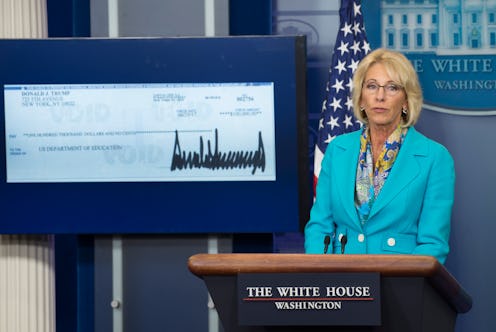
On Thursday, Education Secretary Betsy DeVos delivered a speech at George Mason University in Virginia, criticizing the Obama administration's implementation of Title IX. Originally introduced in the Education Amendments of 1972, Title IX prohibits federally-funded institutions from discriminating based on gender. But DeVos announced that she wanted to "revise" Title IX with a "notice and comment" approach in her address on Thursday.
While addressing the crowd, DeVos said that the current method of addressing sexual assault and gender discrimination on campuses constituted a "failed system" which was an "anathema to the system of self-governance to which our founders pledged their lives over 240 years ago." An alternative, according to the education secretary, would involve a "notice and comment" policy to improve the previous administration's guideline on conducting investigations concerning allegations of sexual assault and/or gender discrimination. According to DeVos, such an approach would be designed to "incorporate the insights of all parties."
The "parties" DeVos mentioned in her speech referred to accusers and the accused in campus sexual assault and discrimination cases. Observers noted that DeVos made special effort to mention the supposed plight of those who are accused of violence or bias on campuses. While describing the current system as "kangaroo courts," DeVos said, "Every student accused of sexual misconduct must know that guilt is not predetermined" and that there are people "who are wrongfully accused" who deserve to be heard.
The "notice and comment" policy wasn't the only tentative plan meant to improve Title IX; DeVos also mentioned a "Regional Center" model which would be a "voluntary, opt-in center where professionally-trained experts handle Title IX investigations and adjudications." The supposed purpose of such a model would be to avoid the alleged failures of the "school-based tribunal" which DeVos said failed both parties.
DeVos described the alternative as something that would operate as a "partnership" among attorneys general and the relevant schools where the report of sexual assault or discrimination was submitted. Such a model would apparently be designed to work cooperatively with the law enforcement agencies of that school's district while making full use of resources to "collect and preserve forensic evidence, facilitate — but never require — criminal prosecutions."
According to the education secretary, such a model, as opposed to the current form of Title IX, will lead to "fair investigative techniques" and not "tribunals" at schools that apparently work on "hearsay or incomplete evidence."
At this moment, DeVos' future plans seem unclear. From saying that she would "revise" Title IX in Thursday's speech to claiming that she would ultimately rescind it in an interview on CBS News, the future of Title IX remains shaky.